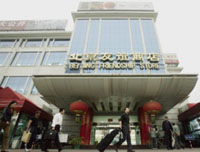
The Beijing Friendship Store, built in 1964 to cater to foreigners, is to undergo a major facelift.
The Beijing Xidan Friendship Group and Noble Strength International Ltd have signed a deal in Beijing to redevelop the traditional department store into a modern commercial complex.
The Beijing company will provide the land, while its partner will be responsible for all the capital needed for the redevelopment.
"The total investment is expected to be at least 4 billion yuan (US$500 million)," said Macao business tycoon Stanley Ho.
Ho's ACE Brand Investment Ltd holds a majority stake in Noble Strength, while Australia-based AustChina Investment and Development Pty Ltd has a minority stake.
"The location of the Friendship Store along Chang'an Avenue and in the central business district (CBD) is of high business value. This is the reason overseas investors pool the money in," said a retail analyst from CITIC China Securities.
"We aim to build a new landmark building on Chang'an Avenue," said Ian Tang, CEO of AustChina.
Australian firm PTW Architects has been hired to do the design work for the redevelopment, which includes two office buildings of 21 floors, a 29-floor block of serviced apartments and an eight-floor department store.
The redevelopment is scheduled to begin by the end of this year and will be completed in the first half of 2009.
However, it is still waiting on approval from local governments, said Liu Xiuling, general manager of the Beijing Xidan Friendship Group.
According to Liu, "the new design makes better use of the land."
Currently the store's commercial space is only less than 10,000 square meters. After the redevelopment, the total commercial space will be up to 150,000 square meters, with some 60,000 square meters for department store business.
Liu told reporters that the store's management team has been considering bringing in investors to rebuild the store for a few years, but the right partner was not found until recently.
The Beijing Friendship Store is a result of China's planned economy in the 1960s. It opened to foreign residents and tourists before the country's economic reform and opening up began.
For Chinese, shopping at the department store was a symbol of identity; hard-to-find foreign goods could be purchased only with passports and foreign exchange certificates in the 1970s.
The store has reoriented itself to adapt to the market; however, it has not performed well.
The store reported a loss for 2004 of more than 3 million yuan (US$370,000), while its net profit was only 79,200 yuan (US$9,900) in 2005.
Liu put this down to a small business scale and poor facilities, which could not meet consumer demand as the municipality rapidly developed.
Retail analysts said it is difficult to predict whether the new commercial complex would perform well as there are many existing and new commercial centers in the CBD and competition is fierce.
(China Daily July 7, 2006)
|

